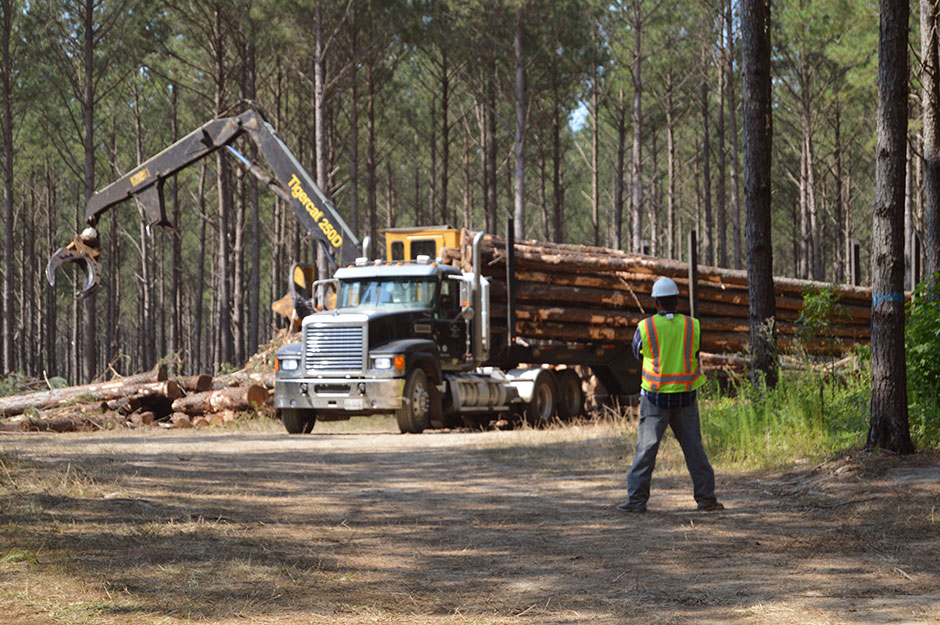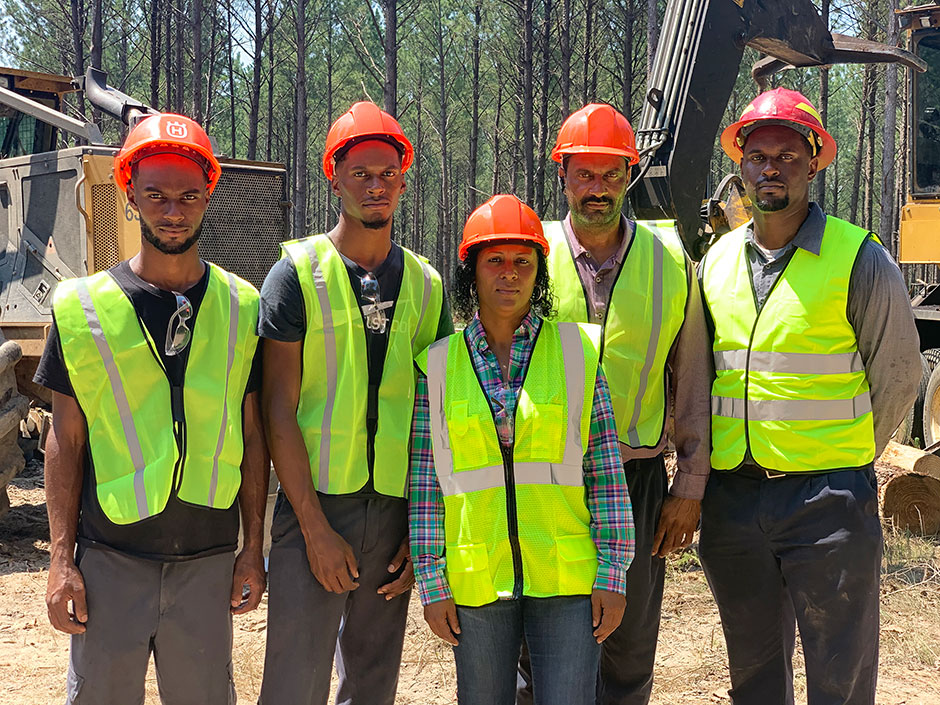4th May 2021
Alabama’s Logger of the Year Michael Hutchins, founder of Hutch Trucking Inc. likes to get things right the first time. It’s why he has spent his entire life working hard and doing everything to the best of his ability. It’s this dedication to perfection that would serve him well for the rest of his life, but not before a few bumps in the road.
– Joel Moon, executive director, Alabama Loggers Council, Photos by Ashley Whittle Tiedt

Mike doesn’t spend time playing on his phone. In fact, he has a flip phone. He uses it to make phone calls and nothing else. “If that’s old school, I’m OK with that.”
Mike grew up in the Boyd community of Sumter County. School taught Mike a lot of lessons and one of those lessons was that he didn’t like school. He was a part of the 4-H Club and being true to himself, he strived to be the best one in class. The class assignment was to build a wooden shoe box.
Mike didn’t have many tools, but he did have an old hand saw and a claw hammer. On the day students were to present their shoe boxes, the instructor called Mike out. Instead of praise for a job well done, he accused Mike of having someone else help him make the shoe box. He had worked night and day on that shoe box, and he was hurt by the accusation that he had cheated. It was on that day, he decided he didn’t care for school. Mike said, “I learned not to worry about what people say, just show them who you are.”
This 4-H class isn’t what caused Mike’s disillusion with school, it only increased it. As a young boy, he started hanging out at a nearby sawmill and would eventually end up working there. He continued working there into his teen years – all the while becoming less and less interested in school. Mike said, “It looked like school was holding me up.” He would even pretend to be sick so his grandmother would let him stay home from school. As soon as the bus left, he’d change his clothes, slip out the back door and make his way through the woods to the sawmill. His grandmother eventually found out and made him go to school. But that didn’t deter Mike. He wanted to work at the sawmill.
At fifteen, he quit school and did just that. The sawmill cut hardwood and Mike had the opportunity to work in many different areas. “We stacked lumber and crossties. They cut a lot of ties. I learned how to merchandise while on the yard using a bow blade saw. Logs had to be cut right, you could not cut a log in half and throw half of it away. I really took in and learned that – merchandising is the key to logging,” he said. The more time he worked, the more he learned about merchandising. “Merchandising is where the dollars were.”
Working at the sawmill gave Mike his break into the logging business. Billy Trawick at Bill’s Timber Company approached Mike one day at the mill. Trawick offered him $50 cash to wash his frontend loader. Mike said he had never made $50 in a week, let alone a few hours and took on the task. True to his perfectionist nature, Mike washed the loader inside and out. When he was finished, it looked like new. Along with paying the $50 as promised, Trawick offered Mike a job running his logging crew.
Mike tried to tell Trawick that he couldn’t run his crew, but Trawick told him he had been watching him and knew that he was able to do the job. Trawick bought a loader, a skidder and two trucks for Mike’s crew. They did not have a cutter, but had two older guys felling with chainsaws. “You wouldn’t believe it, but we were getting eight to ten loads a day out. I was cutting up logs and merchandising, and loading trucks,” he said.
Mike’s crew was cutting shortwood at the time and that was starting to fade out, not to mention he was having a hard time finding people to work. On top of that, some of the people he did have on the crew would decide they didn’t want to work and wouldn’t show up. On those days Mike went to the woods alone. After three years like this, Mike decided it was time to go back to the sawmill.
One day while working at the sawmill, he was approached by Wayne Springfield, a contract trucker who hauled to the sawmill. Wayne suggested they go into business together and start their own logging crew. Mike knew Wayne didn’t know much about logging, but they decided to give it a shot. They borrowed money, bought some equipment and S&H Logging was formed. Mike was in charge of logging and Wayne was in charge of the hauling. S&H Logging contract cut for Larry Strickland, owner of Southern Logging, and they operated this way for about four years.
MERCHANDISING IS THE KEY TO LOGGING.
Mike recalls, “It was a good four years. I got a chance to experience partnerships, grew in the business, made some money, and saved some money.” After four years Mike wanted to expand the business, but Wayne was looking to back away, so they decided to part ways and split their assets. Wayne kept most of the logging equipment and continued to log for a time.
It was at that time in 1997 that Hutch Trucking Inc. was formed. “I was tired of the headaches that came with logging at that time. I was young, and I just wanted to drive a log truck, but that only lasted one day.” Sitting in line at the mill and listening to drivers yack on the CB radio all day was not Mike’s dream and he decided he would go back to logging.
Mike talked to Larry and resumed contract cutting for Southern Logging, operating as Hutch Trucking Inc. He already owned a cutter, rented a loader from Larry’s brother Glen Strickland and bought a skidder. “That loader was worn out, but I made it work and soon I was able to buy my own loader, a better loader.” Mike cut for Southern Logging for about ten years. Over time markets became tough and quotas shrank. Southern Logging had been a great place to work, but Mike could see it was time to explore his options.

One Monday morning Mike only received three load tickets for the week. He had them filled before lunch and left the woods. As fate would have it, he ran into John Talley, procurement manager for Westervelt, at the local gas station. Mike explained that he needed a place to cut, but John answered that he wasn’t in the business of poaching other folks’ loggers. Mike persisted and gave John his number. “John never made it over the interstate bridge before he called and asked when I could start. I told him I was ready now.” He came back to the gas station, picked Mike up and showed him a tract of timber. Mike says it’s the best tract he ever cut. Once the job was complete, John indicated that as long as he was in the logging business, Mike would not have to worry about a place to cut.
When he started out Mike ran John Deere. “I used to bleed green and yellow. Everyone around was running John Deere and my service truck was full of John Deere parts. In the early nineties I saw a Tigercat and was so impressed I decided I needed to find a Tigercat dealer.” Unfortunately, there wasn’t a Tigercat dealer in the area until the B&G Equipment Moundville facility opened in 2015. Mike’s first purchase from the Moundville location was a Tigercat 726G in April 2015. Currently he is running six Tigercat machines – two 726G bunchers, three skidders and a 250D loader. Today Mike believes, “If a man is not running Tigercat, he is not in the logging business, he’s in the ‘mechanicing’ and parts business.” On the hauling side, he still runs a fleet of seven trucks.
Mike deals with sales specialist, Tom Kizziah at B&G. “Mike has been and continues to be one of B&G Equipment’s most loyal customers. He is still running the first 726G he purchased in 2015 with no plans of resting the machine. Mike is a great asset for us in that he is not only a great customer, but also a big advocate for B&G Equipment and Tigercat. Once I was talking to a potential new customer about Tigercat and B&G when Mike walked in. I left them at the parts counter to talk and when I returned, I believe if I had paperwork for a new machine, he would have signed right then and there.”
Mike and his crew go above and beyond when it comes to sustainability and protecting the environment. Mike adheres to Alabama’s BMP standards, and his tracts are audited annually by SFI, PEFC, and FSC certification auditors. To date, his crew has yet to receive a non-conformance. Mike’s crew implements SFI Guidelines to the highest standard. Each harvested tract is under a forest management plan and each landowner is provided with the Alabama SIC’s A Landowner’s Guide to Sustainable Forests publication prior to harvesting. In regards to erosion protection measures, Mike effectively uses water bars, broad based dips, and turnouts to control overland water flow following harvests. Landings are closed out in a manner consistent with BMP standards before moving to the next loading ground.
Mike’s crew spends approximately 70% of the year conducting clear felling and the remaining 30% in second thinning operations. Each harvest has a pre-timber sale plan along with detailed maps that are distributed among the crew members. The timber sale plan outlines planned access routes, SMZ prescriptions, sensitive areas, boundary line descriptions, and harvest prescription. Because of Mike’s reputation as an honest businessman that places sustainability at the forefront of his operations, landowners continually request his services, often years in advance.
Mike has some concerns for the future, concerns that many loggers share. Trucking regulations and the search for competent drivers are the top of his list. He feels attracting young employees is a challenge for the future as well. “Everyone is hung up in a glass brain,” he said. He’s referring to smartphones. Mike doesn’t spend time playing on his phone. In fact, he has a flip phone. He uses it to make phone calls and nothing else. “If that’s old school, I’m OK with that,” he said.

A family business. Chanse, Kannon, Tonya, Michael Sr., and Michael Jr.
Mike and his wife Tonya have three sons and two daughters. Tonya is a teacher in addition to her role as advisor and bookkeeper for the family business. Tonya and Mike have passed on their outstanding work ethic to their sons, Michael Jr., Kannon and Chanse. Mike hopes one day to also pass the business down to his sons. To that end Michael Hutchins Jr. recently graduated from Alabama A&M University with a degree in Forestry. Mike and his sons also run a farming operation with 260 head of cattle.
Although Mike is not very comfortable talking about his community involvement, crew foreman, Whitney Brown comments that he is always willing to help people in the community. It could be cutting a tree down for someone, putting gravel on someone’s driveway. “Everyone at home thinks of Mike as Santa Claus.”
We had the privilege of speaking to many council members, landowners, and business owners within his area of influence and hearing of the great impact he has on those around him. Mike is a cornerstone of the logging com unity and his local community.